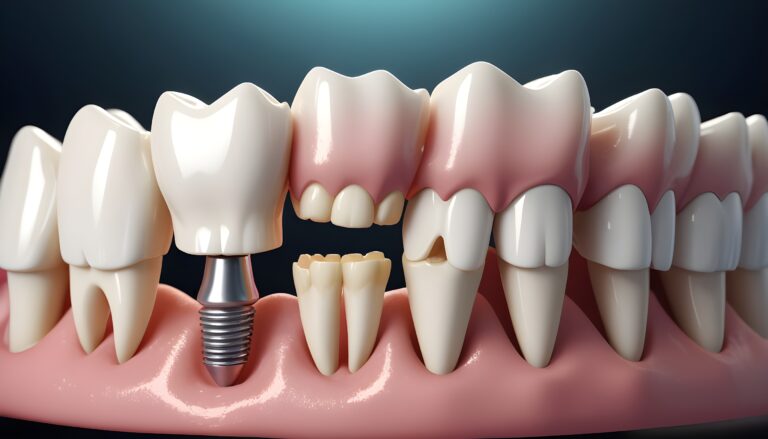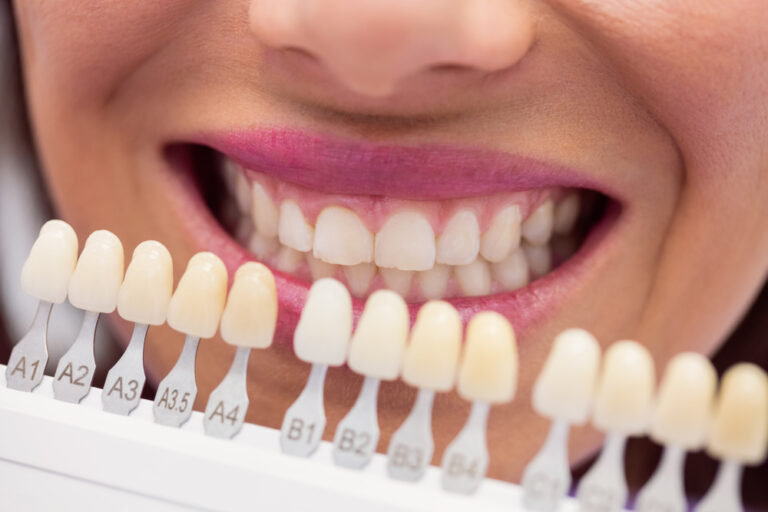Teeth play a crucial role in our overall appearance; having a bright, beautiful smile can boost our confidence. However, many people are still looking for a better color or shape for their teeth. Two popular options are teeth whitening and dental veneers to enhance your smile. This article will explore the differences between these two treatments and help you decide which option is right for you.
Having a bright and radiant smile can significantly enhance your self-esteem and leave a lasting impression on others. If you are unhappy with the color or shape of your teeth, various cosmetic dentistry options are available to help you achieve your desired smile. Among the most popular treatments are whitening of teeth and dental veneers. Both methods can significantly improve the appearance of your teeth, but they have distinct differences that are important to consider.
Understanding Teeth Whitening
It is a non-invasive cosmetic dental procedure designed to lighten the shade of your natural teeth. This treatment is effective in removing stains and discoloration caused by aging, tobacco use, consumption of certain foods and beverages, or poor oral hygiene. Whitening is a popular choice for individuals seeking a quick and affordable way to enhance their smile.
Types of Whitening
There are primarily two types of whitening methods: professional in-office whitening and at-home whitening kits. Professional in-office whitening is performed by a dental professional using a highly concentrated bleaching agent, which produces more immediate and noticeable results. At-home whitening kits, on the other hand, involve the use of custom-made trays and a milder bleaching gel that is applied to the teeth for a specified period. While at-home kits are convenient, they may take longer to achieve desired results.
Pros and Cons of Whitening
Whitening of teeth offers several benefits, including affordability, convenience, and effectiveness in removing surface stains. It is a relatively simple and non-invasive procedure that can significantly improve the aesthetics of your smile. However, teeth whitening may not be suitable for everyone. It is not effective on certain types of stains, such as those caused by tooth trauma or medications. Additionally, individuals with sensitive teeth may experience temporary discomfort during the whitening process.
Exploring Dental Veneers
Dental veneers are thin, custom-made shells bonded to your teeth’ front surface. These shells are usually made of porcelain or composite resin and are designed to improve the appearance of teeth by altering their shape, size, length, or color. Dental veneers are a versatile option for individuals looking to address a wide range of dental issues, including discoloration, chipped or cracked teeth, gaps between teeth, and minor misalignments.
Types of Dental Veneers
There are two main types of dental veneers: porcelain veneers and composite veneers. Porcelain veneers are highly durable, stain-resistant, and closely resemble the natural appearance of teeth. They require minimal tooth preparation and can last for many years with proper care. On the other hand, a dentist directly applies and shapes tooth-colored resin material to create composite veneers. While composite veneers are more affordable, they are generally not as long-lasting as porcelain veneers.
Pros and Cons of Dental Veneers
Dental veneers offer several advantages, including their ability to provide a complete smile makeover by addressing multiple cosmetic issues simultaneously. They can effectively mask dental imperfections and provide a natural-looking, aesthetically pleasing result. However, dental veneers are irreversible, as a small amount of enamel is typically removed from the teeth to accommodate the veneers. Additionally, veneer costs can be higher than other cosmetic dental treatments.
Choosing the Right Option
Considerations for Teeth Whitening
Whitening is suitable for individuals with mild to moderate tooth discoloration and looking for a relatively quick and cost-effective solution. It is essential to have realistic expectations about the outcome of the treatment, as it may not be able to achieve a drastic change in tooth color, particularly for deep stains. Consulting with a dentist will help determine if whitening is right for you based on your specific dental needs.
Considerations for Dental Veneers
Dental veneers are an excellent choice for individuals with more severe cosmetic dental concerns, such as chipped, cracked, or severely discolored teeth. They offer a long-lasting solution and can dramatically improve the appearance of your smile. However, it is essential to note that dental veneers are a more invasive procedure compared to whitening, as some enamel must be removed. A thorough consultation with a dentist is essential to assess your oral health and determine if veneers are suitable for you.
Consulting with a Dentist
When deciding between whitening and dental veneers, consulting with a qualified dentist is crucial. A dentist can evaluate your oral health, discuss your aesthetic goals, and recommend the most appropriate treatment option for you. They can provide personalized advice based on the condition of your teeth, ensuring that you make an informed decision and achieve the desired outcome.
Conclusion
In summary, teeth whitening and dental veneers are effective cosmetic dental treatments that enhance your smile. Whitening is a non-invasive procedure that focuses on lightening the color of your natural teeth. At the same time, dental veneers involve the application of thin shells to improve the shape, size, and color of your teeth. The choice between the two depends on your dental concerns’ severity, desired outcome, and budget. Consulting with a dentist will help determine the most suitable option for you, ensuring that you achieve the smile you’ve always wanted.





